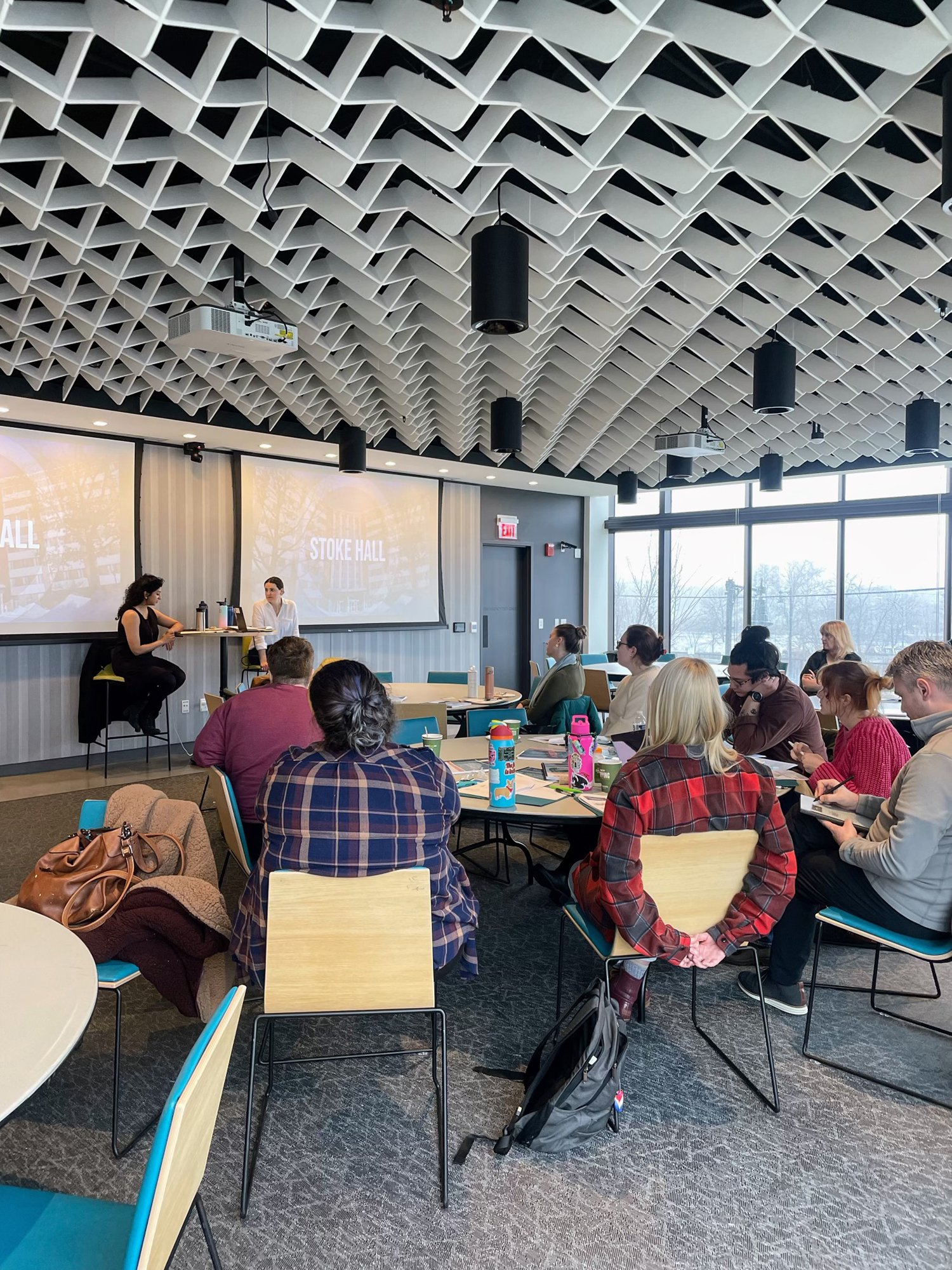The Benefits of In-Person Training: Bringing in the Bystander® Train-the-Trainer Workshop hosted by Boston University
Soteria Solutions has been working over the last year to make meaningful updates to our Train-the-Trainer Workshop for Bringing in the Bystander® (BITB) College. Our goal has been to streamline the content, add more intentional opportunities for attendee engagement and prepare campuses to adapt and implement BITB in their unique communities.
Lead Trainers Meera Seshadri and Lee Helmken Cherry recently had the opportunity to implement this new Train-the-Trainer format during the year’s first in-person training at Boston University (BU). The university elected to host the training for facilitators and stakeholders to allow for face-to-face interaction between trainers and participants, fostering a space for more rich and transparent engagement, collaboration and real-time feedback.
Benefits of In-Person Training
Soteria Solutions’ in-person training sessions are highly tailored to the specific needs and organizational profile of the host and participants. The Lead Trainers adapt their approach, pacing and content delivery in real time based on the feedback and progress of participants, ensuring a personalized and effective learning experience while also encouraging participants to build rapport and develop a sense of camaraderie. Meera and Lee, both local to the Boston area, tapped into their wealth of experience developing and leading violence prevention programs for higher education institutions, and loved the opportunity to draw on this experience to facilitate meaningful conversations throughout the training.
This full-day workshop was hosted by BU’s Sexual Assault Response & Prevention Center (SARP) in the Howard Thurman Center for Common Ground. Pre-training conversations with Ashley Slay, Associate Director of Interpersonal Violence Prevention at SARP enabled the trainers to adapt the training and the flow of the workshop to be aligned with SARP.
The Importance of Institutional Readiness
The conversations throughout the day were especially rich due to the customization and SARP’s commitment to facilitation strategy and institutional readiness. Throughout the training, Ashley was thoughtful and intuitive in increasing the topic’s relatability and meaningfulness to the attendees. For example, during a small group discussion activity regarding customization and adaptation of the BITB curriculum components, Ashley made a point to have participants from various offices switch tables so that there was a representative from each team in every small group.
Although Lead Trainers are skilled at working with participants and institutions at all levels of readiness to implement BITB, the workshop at BU was especially exciting given the strong administrative and structural capacity for both implementation and reaching students. It was energizing to learn that not only is there strong financial support from leadership, but that SARP is leading an intentional, campus-wide implementation strategy that includes plans to train student ambassadors as BITB facilitators and partner with other stakeholders to reach disparate, underrepresented groups. In addition to seeing parts of the BITB curriculum modeled and learning about the pedagogy and structure of the program, Lee and Meera led discussions that facilitated knowledge and idea-sharing, fostering collaborative energy across partner offices, and stressing the importance of consistent messaging throughout the community.
Throughout the training, Lead Trainers and facilitators engaged in multiple in-depth and nuanced conversations surrounding the implementation of BITB. The essential components of a comprehensive and sustainable health communication strategy were discussed, such as: navigating safety and power dynamics during scenario discussions and skill-building; acknowledging the lack of representation for minoritized populations in both national and campus-level data, and the need to address these gaps through climate surveys and research; meaningfully engaging students in primary prevention efforts from all facets of campus life; and more intentional collaboration among partner and stakeholder offices. The day ended with a discussion of the importance of evaluating BITB and the ways Soteria can partner with campuses to support their efforts.
Evaluation – Feedback from the Participants
The ability to assess if a program is effecting meaningful and sustainable change is important to Soteria Solutions and is integral to how we partner as a catalyst to ignite change.
Below highlights two ways we evaluated the train-the-trainer workshop hosted at Boston University:
Evaluation results from the workshop showed that 100% of respondents agreed or strongly agreed that:
The content of the presentation was well organized.
The trainers provided an adequate balance of teaching and interaction.
The topics covered during the training were relevant to their needs.
They received enough support from this training to carry out the BITB curriculum.
A selection of participants’ key takeaways they found most helpful during the in-person train-the-trainer workshop include:
“Seeing an example of how co-facilitation can best work.”
“The opportunity to bounce ideas off of colleagues.”
“Talking through specific situations as they apply to Boston University.”
“Breaking down how to present certain parts of the training.”
“Adapting to our program and what would be best practices.”
It is always invigorating to be in person and especially to work with a group where there is strong leadership alignment and organizational readiness. Thank you to Boston University for hosting this in-person training and for implementing Bringing in the Bystander at your campus.
Learn more about our solutions for Colleges. Learn more about Bringing in the Bystander College and our training options.
Are you interested in planning an in-person training at your college or university?
Please contact us.

